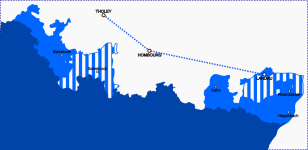2) Saarland becoming French (important resources)
You'd need the armistice to be delayed ITTL even by a month, necessarily implying a much less revolutionary context in late 1918 Germany and that the German withdrawal on the western front stabilizing in better conditions, that is less unit losses and turnover and possibly reaching a Bruxelles/Namur/Mezières/Metz line early and orderly enough to give the impression they could hold on them during negotiations (without actual hope of a lasting control). Basically, giving the OHL just enough rope to hang themselves.
From there, you'd see the Lorraine Offensive taking place as planned on the 14th November, without much actual military difficulties, ending up not only with French armies taking back Moselle, encircling Metz and likely pushing in Sarre before TTL Armistice takes place.
That would give actual ground for France, when directly recovering Alsace-Moselle in 1918 (as part of the armistice conditions),
to add in territories considered by most of the political circles as an integral part of it, i.e. those included in the 1789 border : Sarrelouis, Dahn, northernmost Alsace, etc. and possibly including places lost from the
Treaty of Paris of 1814 (Saarbruck and Landau, essentially).
From there I don't think this 'greater Alsace-Lorraine' would have a much different fate than IOTL : that is being effectively and fully reintegrated within French metropolitain territory and whose mention in the Peace treaty being a post facto officialization.
With the important caveat that local population would much, much less inclined to agree (let alone support) such changes, and while Alsace saw 1/3 of Germany-born population leaving (often forcefully) after 1918 with essentially a purge of those in army, political or religious notability along with urban workers, that wouldn't be possible in Sarre, meaning that France would have to rely on an at best combative population until an hypothetical gradual acceptance of the situation albeit likely very active in or along Alsatian autonomist movements.
Something the military, diplomatic and politic circles were keenly aware of and the reason why they didn't really want to push for large annexations.

You might, depending on how the situation in Germany unfolds, see an actual push for "straightening" the border on the Tholey/Hombourg/Landau line prospected IOTL during the war for strategical reasons but I don't really see why Britain and United States would be more favourable to this than they were about French claims in the region and might as well just refuse to support them except some minor rectifications. That said, you might see this region being removed from Germany as a sort of Saar Territory equivalent, some sort of "Palatinate Territory" with the reminder of Sarre and filling the gap between French Sarre and Alsace.


